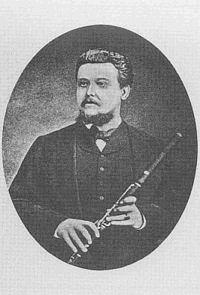Friday and Saturday 31 July and 1st August sees Steve and pianist Tomoko Sawano (as on World of the euphonium Vol.5 and Audacious) in the Studio 7 at the RNCM ,recording the solo brass repertoire of the 19th century Belgian composer Jules Emile Demersseman.

Jules (Auguste Edouard) Demersseman (1833-1866) was in his time a remarkable flautist and meritorious composer. This obscure composer is only known by flute and saxophone players and his name is even not mentioned in the most reference books. He was born in Hondschoote (north of France) on the 9th of January 1833. In October 1844 he was accepted, at the age of eleven, to the Royal Conservatory in Paris. He studied solfège (class of Alexandre Tariot, flute (Jean-Louis Tulou) harmony (class of Coulet) and counterpoint and fugue (Aimé Ambroise Leborne). From the exams of 1845 he gets a mention for solfège and becomes the first prize for flute at only 12 years of age. The year after this he gets his first prize for solfège. In 1852 he becomes a first mention for counterpoint and fugue and was admitted (without success) to the preparatory test for the Prix de Rome. A year later he was allowed to compete.
The reputation of Demersseman as a flute virtuoso started to develop during the concerts organised by M.Musard (Concerts Musard) in 1856 and would develop later during the concerts in the Paris Casino (organised by Jean-Baptiste Arban) and those in the ‘Champs Elysées'.
The music press was very inspired by his playing : according to Reichert ‘nous ne connaissons rien de plus délié, de plus complet et de plus chantant' (we know nothing more refined, complete or who can sing more on his instrument than Demersseman. According to Fétis ‘son talent était à la fois très fin, très brilliant et très distingué' (his talent was alternating between highly refined, extremely brilliant and very distinguished).
This honourable composer would probably been better-known if he had not have died at the early age of 33 on the 1st December 1866. He died in Paris presumably due to tuberculosis.
In his day, Demersseman was the most famous flute virtuoso in Paris. Quickly he gained the nickname ‘The Paganini of the Flute' or ‘The Sarasate of the Flute'. He was destined to become the first superstar flautist, but for only a few years. The comparison of Demersseman with Paganini was apt. Like Paganini, Demersseman was not only a dazzling performer, he was also a composer.
Demersseman as composer.
Despite his early death, Demersseman left a quite remarkable output. His composed most of his works for his own instrument: a lot of works for flute and piano and also some in the bigger musical forms (such as the three sonatas for flute and piano).
Like Paganini, his works are much more than mere showoff pieces for his fabulous technique. Demersseman was a composer of remarkable gifts. His natural ability to spin delightful and mysterious melodies was matched by a mastery of compositional techniques.
The works Steve and Tomoko are recording are works composed for the trombone with six independant valves. These are superbly crafted lyrical and virtuosic works, about 17 works in total.
Albums of all the sheet music will be released with the CD in a few months time, so everyone will get a chance to play these wonderful works
The works that Jules Demersseman wrote for the trombone with six independant valves could be easily subdivided into two main categories : the typical exam-pieces (Solo de Concert) and the themes and variations usually based on well known operatical themes.
Both the typical exam-pieces and the themes and variations breath the Parisian musical taste of that era and the influence of romantism and salon music. Romantism was the avant-garde of this period and Paris was the centre of this movement.
The aim of Sax was to get his new instruments known outside the military world. The repertoire (from the easy exam pieces till the highly brilliant fantasies) was adjusted to the taste of the Parisian public of that era and had as a main purpose to convince the audience of the Parisian salons.
The project is the brainchild of the Belgian conductor,arranger and teacher Luc Vertommen, who will be in Manchester for all the recording sessions.
Recording will be BOCC115 on the Bocchino label

